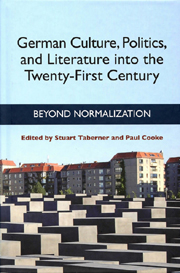Book contents
- Frontmatter
- Contents
- Acknowledgments
- Introduction
- 1 “Normalization”: Has Helmut Kohl's Vision Been Realized?
- 2 Coping with Disparity: Continuity and Discontinuity in Economic Policy since Unification
- 3 Understanding Germany: The Limits of “Normalization” and the Prevalence of Strategic Culture
- 4 “Normalization” through Europeanization: The Role of the Holocaust
- 5 “Representing Normality”: Architecture in Berlin
- 6 “Normalizing” the Past: East German Culture and Ostalgie
- 7 National Memory's Schlüsselkinder: Migration, Pedagogy, and German Remembrance Culture
- 8 The Return of “Undead” History: The West German Terrorist as Vampire and the Problem of “Normalizing” the Past in Margarethe von Trotta's Die bleierne Zeit (1981) and Christian Petzold's Die innere Sicherheit (2001)
- 9 “Normalizing” the “Old” Federal Republic? The FRG between 1949 and 1989 in Recent German Fiction
- 10 Reconciliation between the Generations: The Image of the Ordinary German Soldier in Dieter Wellershoff's Der Ernstfall and Ulla Hahn's Unscharfe Bilder
- 11 “(un)sägliche Vergleiche”: What Germans Remembered (and Forgot) in Former Yugoslavia in the 1990s
- 12 “Normal” as “Apolitical”: Uwe Timm's Rot and Thomas Brussig's Leben bis Männer
- 13 “Narrative Normalization” and Günter Grass's Im Krebsgang
- 14 From “Normalization” to Globalization. German Fiction into the New Millennium: Christian Kracht, Ingo Schulze, and Feridun Zaimoğlu
- 15 Abnormal Consensus? The New Internationalism of German Cinema
- Notes on the Contributors
- Index
9 - “Normalizing” the “Old” Federal Republic? The FRG between 1949 and 1989 in Recent German Fiction
Published online by Cambridge University Press: 05 February 2013
- Frontmatter
- Contents
- Acknowledgments
- Introduction
- 1 “Normalization”: Has Helmut Kohl's Vision Been Realized?
- 2 Coping with Disparity: Continuity and Discontinuity in Economic Policy since Unification
- 3 Understanding Germany: The Limits of “Normalization” and the Prevalence of Strategic Culture
- 4 “Normalization” through Europeanization: The Role of the Holocaust
- 5 “Representing Normality”: Architecture in Berlin
- 6 “Normalizing” the Past: East German Culture and Ostalgie
- 7 National Memory's Schlüsselkinder: Migration, Pedagogy, and German Remembrance Culture
- 8 The Return of “Undead” History: The West German Terrorist as Vampire and the Problem of “Normalizing” the Past in Margarethe von Trotta's Die bleierne Zeit (1981) and Christian Petzold's Die innere Sicherheit (2001)
- 9 “Normalizing” the “Old” Federal Republic? The FRG between 1949 and 1989 in Recent German Fiction
- 10 Reconciliation between the Generations: The Image of the Ordinary German Soldier in Dieter Wellershoff's Der Ernstfall and Ulla Hahn's Unscharfe Bilder
- 11 “(un)sägliche Vergleiche”: What Germans Remembered (and Forgot) in Former Yugoslavia in the 1990s
- 12 “Normal” as “Apolitical”: Uwe Timm's Rot and Thomas Brussig's Leben bis Männer
- 13 “Narrative Normalization” and Günter Grass's Im Krebsgang
- 14 From “Normalization” to Globalization. German Fiction into the New Millennium: Christian Kracht, Ingo Schulze, and Feridun Zaimoğlu
- 15 Abnormal Consensus? The New Internationalism of German Cinema
- Notes on the Contributors
- Index
Summary
In the late 1990s, against the background of the publication of many notable narratives about the former East Germany (GDR) and its postunification transformation, the appearance of a number of texts by young authors from the west signaled that the West German past too had become the object of literary scrutiny. Of course, many writers from the “old,” that is, preunification Federal Republic (FRG) had already had their say on this topic since 1990, including prominent figures of the West German literary scene such as Uwe Timm, F. C. Delius, and Ludwig Harig and less familiar names including Ralf Rothmann and Ulrich Woelk. But what was striking now, almost a decade after the fall of the Berlin Wall, was not just an increase in the quantity of literary texts focusing on West Germany between 1949 and 1989. Nor was it that many of the writers had been all but unknown just a few years earlier. Rather, it was the nostalgic, and occasionally ambivalent, picture of the unremarkable fabric of everyday life in the “old” Federal Republic painted by writers whose formative years had fallen in the 1970s and 1980s such as David Wagner, Frank Goosen, Karen Duve, and Gerhard Henschel.
In a postscript to Meine nachtblaue Hose (2000), David Wagner relates that he had set out to write his début novel in order to understand “wie es in Bonn, in der alten Bundesrepublik und in Berlin gewesen sein könnte, bevor die Oberbaumbrücke wiederaufgebaut war.”
- Type
- Chapter
- Information
- German Culture, Politics, and Literature into the Twenty-First CenturyBeyond Normalization, pp. 137 - 150Publisher: Boydell & BrewerPrint publication year: 2006

